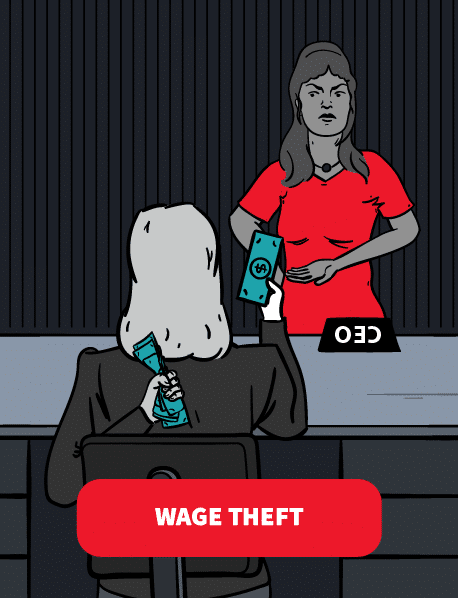New York Independent Contractor Rights
Most employment laws do not cover independent contractors. So how can you protect your rights?
Many employment laws only cover employees, not independent contractors. But special laws protect the rights of independent contractors.
For example, it is against the law for employers to illegally misclassify a worker as an independent contractor rather than an employee. Yet many companies violate this law, which is a form of wage theft.
It’s also against the law to refuse to pay independent contractors. In New York, your independent contractor payment rights include the right to receive compensation for your work.
Independent contractors in New York benefit from the country’s strongest employment protections. New York City’s Freelance Isn’t Free Act protects your right to get paid. When clients violate these laws, independent contractors can receive unpaid wages, denied benefits, and more.
Learn about independent contractor rights or reach out to a New York independent contractor lawyer for a free consultation today.
Know Your Rights – What is an Independent Contractor?
An independent contractor performs professional services for a client on a contractual basis. Independent contractors do not receive the same employment protections as employees.
It is cheaper for a company to misclassify you as an independent contractor rather than an employee.
Employers don’t have to provide independent contractors with overtime pay or even pay the minimum wage. They can also avoid having to pay Social Security and Medicare taxes, unemployment insurance, disability insurance, and workers’ compensation insurance if a worker is classified as an independent contractor rather than an employee.
Misclassification of employees is a major problem – it deprives workers of wages and benefits that they are legally owed.
If you have been illegally misclassified as an independent contractor, you are protected under federal, New York state, and New York City laws. A New York employment lawyer can protect your rights.
Defining Independent Contractors
The question of who counts as an independent contractor is complex and depends on several factors. However, because the wage-hour laws were enacted to protect employees from being cheated by their employers, the term “employee” is broadly interpreted under the law.
There are several factors that define independent contractors. Typically, you are not considered an employee if you have your own business in which you advertise your services to the public, print your own business cards, hire other employees, pay your own expenses, or have a dedicated place of business away from your employer.
You are usually considered an employee if you receive a salary, are paid by the hour, or earn a draw against future commissions (with no need to repay unearned commissions).
There are a number of other factors courts look at in deciding whether a worker is an independent contractor or an employee.
You may be an employee if:
- Nearly all of your income comes from one company.
- The work is long-term as opposed to temporary.
- The work you perform is what the company does.
- You cannot subcontract work from the employer.
- The work does not require highly specialized skills.
- The employer has a lot of control over how you do the job.
- You cannot take on work from competitors of the employer.
- You receive benefits like insurance, a housing allowance, vacation pay, etc.
- You cannot set your hours and work on a schedule set by the employer.
- You are on the company’s payroll.
- You do not pay your own expenses.
- You are not allowed to refuse an assignment.
- The employer gives you workspace, equipment, tools, or supplies.
- The company gives you business cards.
Courts use these questions to determine whether someone is operating as an independent contractor or an employee. This distinction may require employers to provide minimum wage and benefits.
No one factor governs the analysis, but if you are part of a group doing roughly the same thing for your employer, it is likely that you are an employee.
Employers Cannot Misclassify Employees
Just because your employer says you are an independent contractor does not make them right.
Employers often misclassify employees as independent contractors. You may still be an employee rather than an independent contractor, even if you have been misclassified by your employer, who pays you as an independent contractor.
- Receiving a 1099 form rather than a W-2 to list your income does not automatically make you an independent contractor.
- Employers cannot ask you to waive any rights you have as an employee, including forcing you to sign a statement that you are an independent contractor.
- Employers cannot require you to file as a sole proprietor, small business, or under a “doing business as” permit, in order to work for them.
If you are misclassified as an independent contractor when you actually are an employee, you can sue your employer for damages. This is true whether or not the misclassification was deliberate. Ignorance of the law is not a legal defense.
A New York independent contractor lawyer can protect your rights.
Employers are Required to Provide Written Notice and a Wage Statement
Employers are legally obligated to give their employees written notice and a wage statement.
Written Notice
Before you begin working, your employer must provide written notice of your rate of pay, the employer’s legal business name, and other information.
This notice must be written in both English and whatever language you speak as your primary language. Also, your employer must get your signed acknowledgment that you received the written notice. Employers are required to keep your signed acknowledgment on file for at least six years, just like other payroll files.
If your employer fails to provide written notice, they must pay you $50 for each workday that passes without giving you the notice, up to a maximum of $5,000 for each year of employment.
Wage Statement
Similarly, your employer must provide a wage statement, or pay stub, for each pay period. This must list the period of time covered, the rate of pay, the number of hours worked, and any deductions made from your pay.
If your employer fails to provide you with a wage statement, or if the statement is inaccurate, you can collect $250 for each day the violation continues, up to a maximum of $5,000 per year of employment.
Thus, in addition to double damage for unpaid overtime, you may be entitled to an additional $10,000 per year of employment.
Unpaid Wages
Independent contractors are not covered by the minimum wage or overtime rules. However, if you should have been classified as an employee, the damages for misclassification include unpaid wages just as if you were an employee.
If the amount you were paid divided by the hours you worked adds up to less than the minimum wage, you are entitled to the difference.
If you ever worked more than 40 hours in a workweek, you are entitled to overtime pay at the rate of one and a half times your regular rate of pay. Also, as an employee in New York, you are entitled to an extra hour of pay at the minimum wage when you work ten hours or more during a workday.
A New York independent contractor lawyer can help you recover unpaid wages.
Recovering Unpaid Wages
New York’s independent contractor payment rights help contractors recover unpaid wages.
You have two options for recovering unpaid wages. You can file a wage claim with the New York Department of Labor, which will investigate your claim, hold a hearing, and help you recover any wages that are owed. Alternatively, you can file a lawsuit in court.
You do not have to retain a lawyer to pursue either option, although maneuvering a case through the courts is a more complicated process than filing with the Department of Labor. However, if you do retain an attorney, both the FLSA and NYLL require that your employer pay your attorney fees if you are successful on your wage claim.
Depending on how much you are owed, you may be well advised to talk with an attorney who will seek to recover your maximum damages under all governing laws.
You have six years to file a wage claim under state law but only two years to file under federal law (or three years if your employer willfully violated the law).
Liquidated Damages
Not only can you recover your unpaid wages, but you also can receive “liquidated damages.” An award of liquidated damages is equal to the amount you are owed in unpaid wages, thus giving you double damages.
For example, if your employer failed to pay you $5,000 in minimum wage and overtime, you can receive an additional $5,000 as liquidated damages, for a total of $10,000 plus interest and attorney fees.
Although federal and state law permit you to recover liquidated damages, you cannot collect under both.
A New York independent contractor lawyer can help you recover liquidated damages.
Independent Contractors in New York City
In New York City, the Freelance Isn’t Free Act protects freelancers and independent contractors. The act offers strong independent contractor payment rights.
Freelancers Can Receive Double Damages
The Freelance Isn’t Free Act applies to individuals hired or retained for pay. The law requires a contract for work of $800 or more. If the hiring party does not provide a valid contract, they must pay $250 for each violation of the contract requirement.
Freelancers must be paid by the due date on the contract or within 30 days of completing the services. Hiring parties also cannot try to renegotiate the contract to pay less than the agreed rate.
If hiring parties violate the Freelance Isn’t Free Act, independent contractors can sue for double damages. This means independent contractors can receive two times what they were owed on the contract if the client refuses to pay.
The Freelance Isn’t Free Act also protects freelancers who face retaliation, harassment, intimidation, or other threatening behavior. Freelancers can sue for one time the value of the contract for each act of retaliation.
Freelancers Have Up To Six Years to File a Claim
The independent contractor payment rights include strong protections. Freelancers can file a complaint for nonpayment, underpayment, or retaliation for up to six years.
A New York independent contractor attorney can help protect your rights. Learn more about the laws protecting independent contractors by reading about the Freelance Isn’t Free Act or contact Charles Joseph for a free consultation.
Workers’ Rights FAQs

